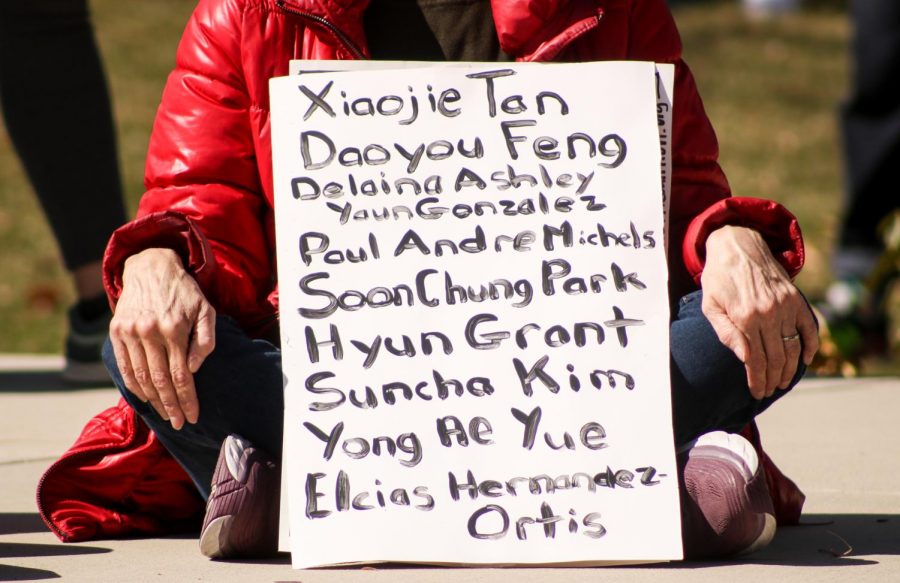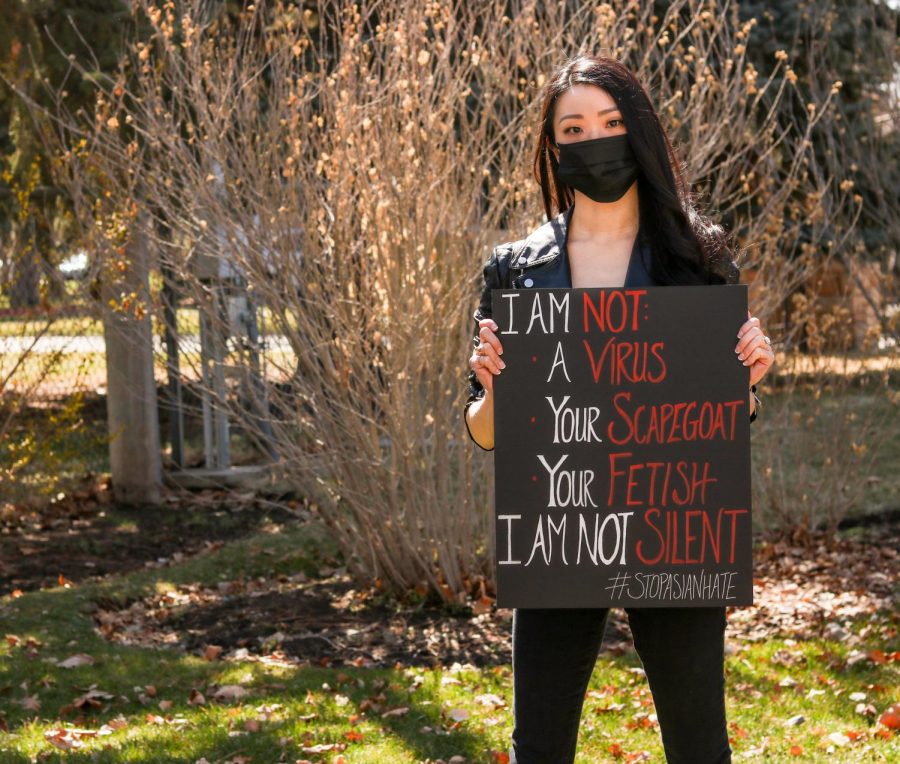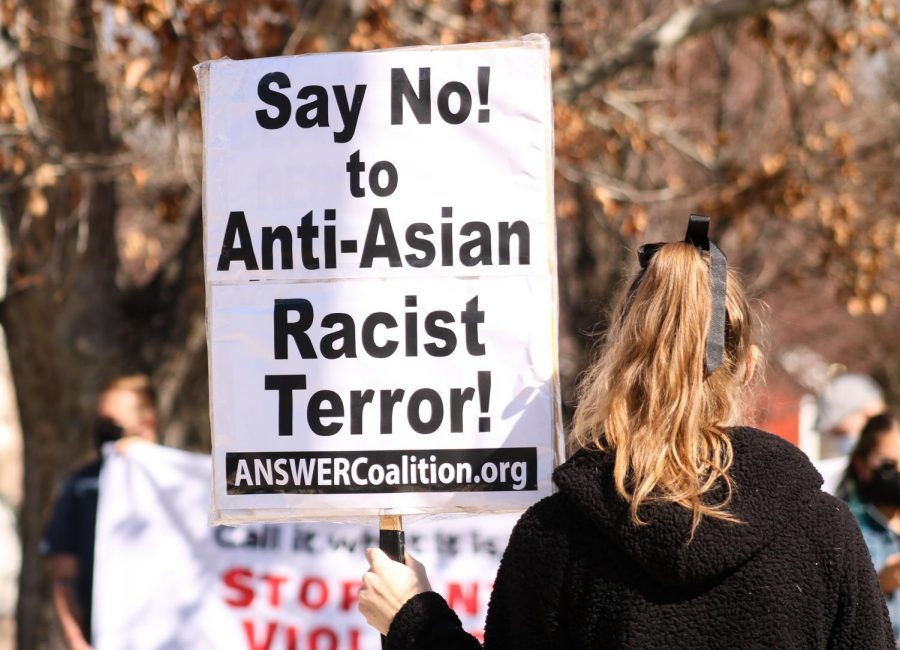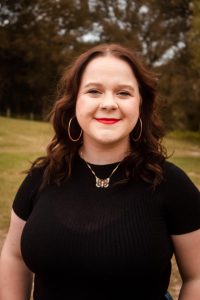Salt Lake City Joins National Day of Action Against Asian Hate
Amanda Lee holds up poster. During the Trump Adminstration there was political rhethoric linking the COVID-19 virus to Asian Americans communities. (Photo by Ivana Martinez | Daily Utah Chronicle)
March 27, 2021
On March 27, Salt Lake City joined 60 cities across the nation in hosting events for a national day of action to “end anti-Asian racism and China-bashing.”
The Utah Party for Socialism and Liberation and ANSWER Coalition co-hosted the “Call It What It Is, A Hate Crime” speak-out at the International Peace Gardens.
It was a part of the national day of action started by the ANSWER Coalition, an anti-racism group.
The protest came in response to the Atlanta spa shootings, where six of the eight victims were Asian women. The protest also focused on the increase of hate crimes against Asian people across the United States.
“All of our local branches were already planning to have protests and rallies around this issue anyway but because it’s under a national banner, I think the effects of this and the spotlight on this is much greater,” said Sheila Xiao, an organizer with the ANSWER Coalition who coordinated the national demonstrations.
Xiao has been organizing with the ANSWER Coalition for over eight years. She also co-founded the peace organization Pivot to Peace.
“We saw this writing on the wall over a year ago and so this is where the group Pivot to Peace formed, where it’s really, I would say, a partnership between the anti-war movement, as well as the Chinese American community,” Xiao said.

Xiao said while speak-outs tend to draw smaller crowds, the collective voices are bringing attention to the issue. She said it is still impactful to listen.
“When I talk to Asian Americans who may not be political but just are your everyday working-class people in the United States, they tell me what they want to see is a diverse outpour of support for our community because we are Americans, nonetheless,” she said.
According to Xiao, the hate directed at the Asian American community should be directed towards the government. She said racism is weaponized as a tool to justify war abroad.
“I think all of us can agree that there wouldn’t be such a racist backlash if, for example, President Trump didn’t call the COVID-19 virus the ‘China virus’ and scapegoat China as the evil country behind this pandemic,” Xiao said.
While Xiao organized the protests nationally, Logan Millette from the Utah Party for Socialism and Liberation coordinated the Salt Lake event. He echoed Xiao’s statements about the importance of the anti-war effort in the fight against anti-Asian hate.
“We can’t really separate out super neatly where domestic anti-Asian sentiment ends and where American imperial policy begins,” Millette said.
Another member of Utah’s PSL, Deja Gatson, started the event by taking a moment of silence for the victims of the Atlanta shooting. Gatson then spoke about the increasing violence against the Asian American community and went on to introduce speakers.
Speaker Annie Michael Lim, a member of Wasatch Tenants United, spoke about her experiences of being fetishized as an Asian American woman.
“Women of color are people, women of color are not a fantasy, a two-dimensional empty figure to project whatever perverse and dehumanizing illusion the eyes of the oppressor wants to see,” Lim said.
Another speaker, Sunwhee Mike Park spoke about the silence that surrounds these incidents in the community. He said he’s been taught to stay quiet, check up on family and move on when bad things happen.
“We Asians and Asian Americans are singularly forward-looking, hardworking and humble people, because of these values, but far too often our silence is mistaken for weakness. And there is a long-standing misconception in this country that we are too weak to stand up for ourselves,” Park said.
Encouraging his fellow Asians to break the silence, Park said it is their duty to bring about real and tangible change.
“Be angry, be appalled and be unaccepting of prejudice and discrimination, becoming embedded into the history and culture of your nation,” Park said. “Stand with us in solidarity and we will stand with you through your battles to overcome racism in this country.”
Elizabeth Maile Aquino Peterson spoke about the beauty of the Asian American experience and her parents’ experiences with racism and xenophobia after immigrating to the United States.
“It’s the large family parties when you eat until your stomach hurts. It’s the iconic bright colors that we paint our houses with and the picking of fresh vegetables. It’s the familiar scents of spices,” Peterson said. “It’s a smallpox vaccine scar on my mother’s arm that reminds me of her immigration to the United States, but with her immigration, comes the intergenerational trauma of being rejected in a new country.”
They also opened the mic to the audience, who spoke about calling out small acts of racism and the importance of seeing support in the community.
Gatson concluded the event with calls to action for the audience to sign petitions and to donate to anti-war peace organizations.
Additionally, she encouraged people to consume alternative forms of media outside of the “white hegemonic and racist platforms and news media.” Flyers were handed out with alternative media sources for attendees to follow.












Winston Delaurier • Mar 29, 2021 at 10:34 pm
Great to see folks coming together like this.